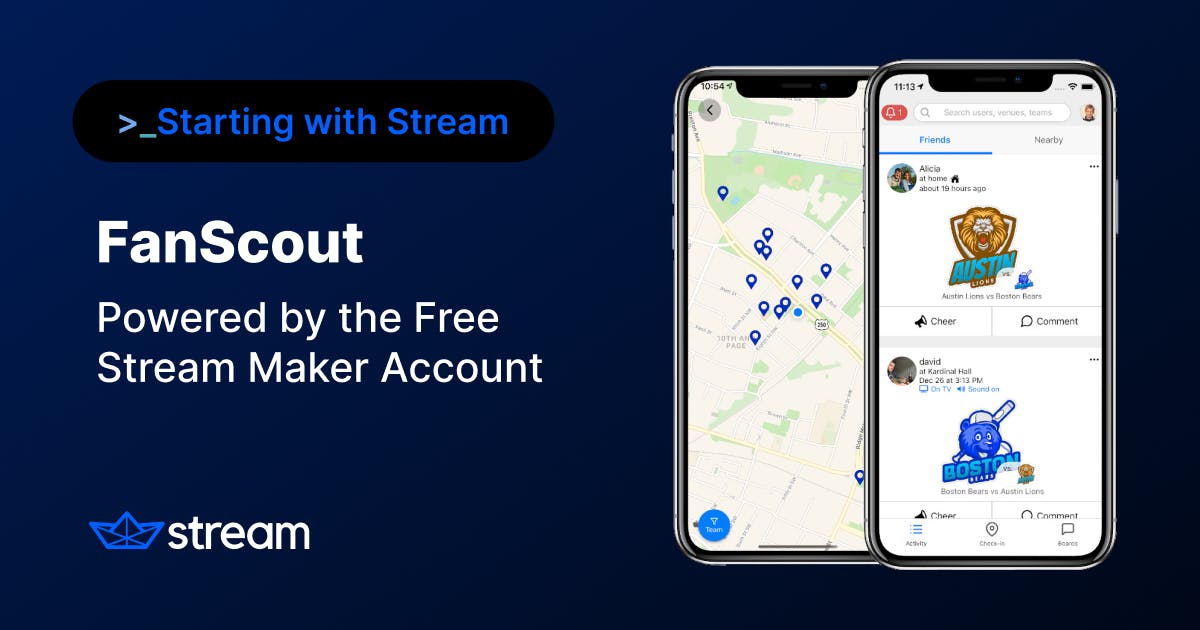Like many great startups, FanScout started by identifying a problem. For developer David Brear, this problem occurred during a weekend trip in New York City.
Brear wanted to catch the Washington Capitals playing the New York Rangers in a sports bar — an important ice hockey game. But after visiting several bars, he couldn’t find one that was playing Capitals vs. Rangers. When he eventually did convince a sports bar to play the game on TV, he ended up watching it by himself — not with other like minded hockey fans. “I thought it had to be easier to find people around you when a popular game is on,” explains Brear.
FanScout is an app that enables sports fans to both find venues that will play their favorite games and gather either in person or virtually to chat about the game in real-time.
To power live in-app messaging and to get his fledgling project off the ground, Brear integrated Stream’s free Maker Account Chat API. Here, Brear explains the challenges of building chat from scratch, his experience integrating Stream’s API solution, and his long-term vision for FanScout.
Stream: Who are FanScout’s core users and customers?
David Brear: FanScout’s core users are sports fans who either have a hard time finding where to watch their team or want to show their loyalty to their team.
Customers of FanScout would be the teams themselves, as we plan to provide teams data about where they're most popular around the country and fan sentiments.
What problem does FanScout solve in the marketplace?
We’re hoping to set ourselves up as a central place for sports fans who are sick of having to juggle a bunch of tools to find where “the game” is playing. FanScout is especially key for soccer and hockey fans who have games at various times on any given day.
We’re also a platform for sports fans to discuss the game before, during, and after the event.
Why is in-app chat essential for FanScout?
Chat is essential for FanScout because we wanted fans to be able to discuss a game in real-time in one central place. For example, we have one beta user who often visits sites such as Discord, Reddit, and Twitter to have conversations about the lineups of his favorite sports teams. Not only is this a fragmented process, but also people from the opposing team often weigh in, which clutters the conversation.
Stream Chat allows us to create segmented channels for sports teams in one single app. Chat also allows fans who don’t follow each other on social media to be able to talk with each other.
How does the Stream Chat API help FanScout be competitive in a crowded app marketplace?
Chat helps FanScout be competitive by keeping fans engaged and communicating with each other. We do actually have an activity feed that we built in-house, but it only allows users to “check-in” while they are watching a game, not post any content.
Soon, we plan to incorporate a team representative/moderator into the chat to conduct surveys, questionnaires, and polls so users can give immediate feedback on plays, team lineups, referee calls, and more. This instantaneous feedback is super valuable for teams. We have ideas for how we can potentially monetize this section of the application, too.
I see that you’re a pretty experienced developer. Why did you decide to use the Stream Chat API instead of building a chat functionality in-house?
I actually tried to build chat in-house first! I was able to code some basic chat functionality that allowed just text and a few custom emojis. But my in-house chat solution was extremely buggy, and the app would randomly crash when users woke their phone back up after setting it down.
The features Stream brings to the table, such as threads, mentions, adding media, and many other things, made it a no-brainer to incorporate. It would have taken the other devs and myself about a month to figure out all of the functionality Stream offers. Why write chat when you can just integrate it?
After we found out that we qualified for Stream’s free Maker Account, “buying” the chat API was a super simple decision for us.
How long did it take you to integrate the chat API into your product?
We were able to integrate Stream’s React Native Chat SDK into FanScout’s prototype in just a few hours — and this includes the time it took for us to learn how your API worked. It was seamless. I was expecting it to be a lot harder and for there to be more configuration.
The documentation was great — it was nearly copy and pastable. The next steps are to customize the UI to fit our branding.
What is your long-term vision for FanScout?
It’d be great to make FanScout more of a loyalty app for sports fans via a point system. We want to be the go-to place where fans discuss games with fellow fans. There are apps for finding information about a game, but very few places where fans can be social and get rewarded for their loyalty.
In the future, Stream is going to be our go-to for activity feeds and chat APIs to help us iterate quickly and validate our ideas!
Does your passion project or startup need an activity feed or in-app chat? See if you qualify for Stream’s free Maker Account!

